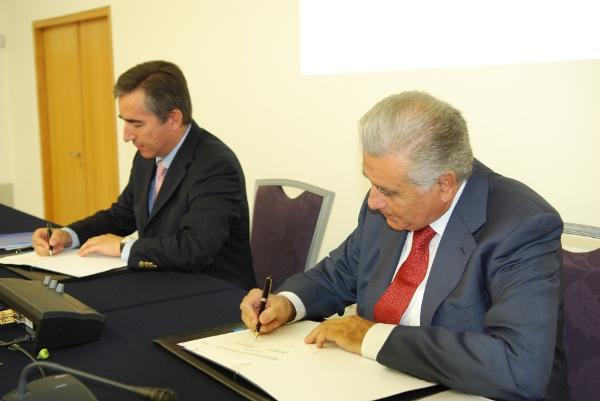
The European Investment Bank is renewing and strengthening its cooperation with the Pancretan Cooperative Bank. The cooperation is in the form of a lending facility worth EUR 15 million for supporting smaller entrepreneurial activity mainly on the island of Crete, as well as in the country as a whole.
The contract was signed today, at a public ceremony in Herakleion in the presence of distinguished members of Crete’s political and business communities, by EIB Vice-President Plutarchos Sakellaris and Mr Yannis Lembidakis, President of the Pancretan Cooperative Bank.
This new operation is the third between the two partners since 2007, demonstrating the quick and efficient channelling of EIB funds to small investment schemes by the Pancretan Cooperative Bank.
EIB Vice-President Plutarchos Sakellaris commented at the signing ceremony: “I am pleased to be on my first official visit to Crete, aimed at boosting our activity on the island. The success of Crete’s development and prosperity is inextricably linked to modern economic infrastructure and small businesses, so we are acting boldly in their favour. Our business support action is amplified by the synergy with our active partner, the Pancretan Cooperative Bank, with whom I am therefore signing a second agreement within nine months. In support of local infrastructure, talks were held with the local authorities, most notably the Nomarch of Herakleion Prefecture, Mrs Evangelia Schinaraki. We are also in talks with the Mayor of Heraklion for the upcoming finance agreement aimed at promoting local development and improving the quality of life in Crete’s major urban centre.”
Mr Yannis Lembidakis, President of the Pancretan Cooperative Bank stated: “We would like to thank the Vice-President of the European Investment Bank for his presence in our Bank today. We are pleased that our successful collaboration with the EIB is continuing as it gives us the opportunity to actively contribute to Crete’s economic growth. Through this cooperation we have managed to channel, in a very short period of time, EUR 60 million to the local market, mainly in the sectors of SMEs and local authorities. Exploiting the favourable financing terms offered by the EIB, we have created specialised products for our customers giving them the opportunity to take advantage of a useful financing tool for their further growth and operation. We are honoured by the confidence that the European Investment Bank has once again shown in us with the signing of today’s EUR 15 million agreement, which supplements the two previous agreements of EUR 60 million. I hope that our collaboration will be continued in the future to the benefit of both organisations”
The Pancretan Cooperative Bank ranks as the largest cooperative organisation in Greece. It provides retail and commercial banking with a strong orientation towards SMEs. Created in 1994, the Pancreatan Cooperative Bank is currently controlled by more than 77 000 individual shareholders and operates mainly on the island of Crete, financing small and medium-sized companies (SMEs) in the fields of industry, business services and tourism.
EIB involvement is expected to generate positive effects for the underlying investments in view of the availability of longer maturities, lower financing costs, and improved terms for enterprises. Simpler and more flexible, this lending arrangement will facilitate financing for all types of investment or expenditure required to support European businesses with fewer than 250 employees, whether in the form of tangible or intangible investment or working capital.
Note to editors:
About the EIB
What is the EIB?
The European Investment Bank was created by the Treaty of Rome in 1958 as the long-term lending bank of the European Union. The task of the Bank is to contribute towards the integration, balanced development and economic and social cohesion of the EU Member States. The EIB raises substantial volumes of funds on the capital markets which it lends on favorable terms to projects furthering EU policy objectives. The EIB continuously adapts its activity to developments in EU policies.
The EIB:
- enjoys its own legal personality and financial autonomy within the EU
- operates following strict banking practice and in close collaboration with the wider banking community, both when borrowing on the capital markets and when financing capital projects.
Who are the shareholders?
The EIB's capital is owned by the 27 member countries of the EU. France, Germany, Italy and the United Kingdom each have 16.2%, followed by Spain, with just over 9%.
What types of project does it finance?
There are six financing priorities, which are laid down by the shareholders and EU mainly in the following sectors:
1. convergence and cohesion, involving the poorest regions of the EU
2. small and medium-sized enterprises
3. energy
4. research, development and innovation
5. infrastructure
6. environmental protection
Key figures: the EIB in 2008
• Total financing operations: 57.6 billion (+21%, compared with 47.8 billion in 2007) of which:
- EU countries: 51.5 billion
- Accession countries: 3.4 billion
- Non-EU countries: 2.7 billion
• Total raised by issuing bonds on the international markets in 2008: 59.5 billion (+ 9%, compared with 54.7 billion in 2007), raised via 247 issues in 18 currencies
• Total stock of funds raised as at 31 December 2008: 253 billion (246 billion in 2007)

Photographer: EIB ©To be defined
Download original